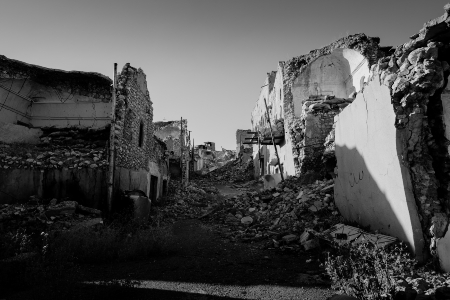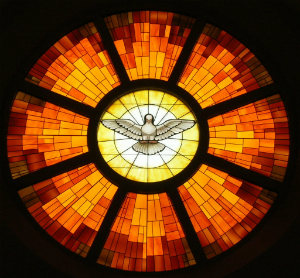Fr Randy Sly on Becoming a House of Prayer
FREE Catholic Classes
Becoming a House of Prayer is the best discipline we can take on. St. Ephraem of Syria states that Virtues are formed by prayer. Prayer preserves temperance. Prayer suppresses anger. Prayer prevents emotions of pride and envy. Prayer draws into the soul the Holy Spirit, and raises man to Heaven. When we rid ourselves of the temple baggage - our money changers and merchants of the heart - we can truly enter into a life of authentic prayer.
Highlights
Catholic Online (https://www.catholic.org)
11/24/2013 (1 decade ago)
Published in Year of Faith
Keywords: temple, money changers, cleansing the temple, Year of Faith
P>WASHINGTON, DC (Catholic Online) - As we come to the end of the Year of Faith and these daily homilies, there is no fitting finish for me than the Gospel for today. Here we see our Lord driving out the merchants and upending the tables in the temple area.
Recalling the words of the prophets Isaiah and Jeremiah, he combines their words regarding the temple and declares, "It is written, My house shall be a house of prayer, but you have made it a den of thieves."
Commerce was a familiar sight at the temple. Pilgrims traveling from out of town had a hard time bringing their sacrifices, so they would buy them at the temple from merchants who made a substantial profit.
In addition, all faithful Jews paid a temple tax, which had to be paid with Hebrew money. At the time of Jesus, Roman currency was the standard throughout the land. Again, pilgrims coming to the city would have to exchange their Roman money to pay the tax. Then, the priests would take what they were given in Hebrew currency and change it back.
As you can see the money changers could make a profit on both sides of that transaction!
Obviously, the merchants or money changers cared little for the spiritual benefits that the people received from their obedience. They only saw a big profit and greed took over.
Now, we can look at this passage and point fingers at ways in which the same practices are held in the Church today with people trying to make money off of those who are attending. Narthexes of many churches are busy after Mass with various fundraisers and ticket purchasing for events. For the most part, this is very benign next to the profit-making incentives of the 1st century temple court.
Let's look instead at a different temple. Being fearfully and wonderfully made, as the psalmist declares us, our temples are to be temples of prayer as well. In fact, St. Paul says that our bodies are temples of the Holy Spirit.
As temples then, we are built to be Houses of Prayer. It is through our communion with God that our hearts becoming knit with his is a special and powerful way. As St. John Chrysostom says, "It is simply impossible to lead, without the aid of prayer, a virtuous life."
So, how do we keep our temples focused correctly as places of prayer? Following the example of Jesus, from time to time we need to cleanse the temple!
Overturning our money changers
Many years ago I saw an interesting book while wandering through a bookstore (Not too many of these are around anymore). The title of the book was "Looking Out for Number 1," and one of the chapters was entitled "Making a Goal is Quite a Bore Unless You Get Credit for the Score."
In more current jargon, we often see the initials WIIFM, which means, "What's in it for me?" What do I get in return for doing something? Sometimes we are looking for praise, payment, or power. Other times, we want a feeling or gratification. This is our payoff for praying.
Particularly, we battle the last two elements when we begin to pray. We want a feeling or some kind of experience that confirms to us that something is going on. Prayer may not always be accompanied by a sense of our souls aflame or our hearts kindled with excitement.
When we pray, we must be sure that we see it as offering ourselves to God, not asking him to give us a certain feeling. I love what St. Benedict said, "Prayer ought to be short and pure, unless it be prolonged by the inspiration of Divine grace."
So, to pray without ceasing is not as much about the length of our prayers as the inclination of our heart. There are times when we might soar in prayer, but when this does not occur be assured you are still praying. The key is to fix ourselves in his direction.
Driving out our merchants
The merchants of our mind always set up close to the moneychangers. Here it is not an emotion that is at work but added sacrifice.
Our thoughts can often derail us by making feel that we aren't doing enough for our prayers to have effectiveness before God. We can sometimes hear the accusations in our mind, "You didn't really pray this prayer with the right fervency. You don't have enough faith. How can God hear your prayers when you aren't kneeling in a church?"
Just like the merchant trying to upsell a pilgrim from two doves to a lamb for the increased profit, we can be convinced that something more needs to be added to our prayers. St. Teresa of Avila once wrote, "Mental prayer is nothing else but being on terms of friendship with God, frequently conversing in secret with Him."
I remember a conversation I had with a friend where he was describing an individual in his parish with whom he was having difficulty. My friend stated, "There isn't anything so simple that he can't make more complicated."
Jesus even admonishes us to look at prayer very simply. And when you pray, you are not to be as the hypocrites; for they love to stand and pray in the synagogues and on the street corners, in order to be seen by men. Truly I say to you, they have their reward in full. "But you, when you pray, go into your inner room, and when you have shut your door, pray to your Father who is in secret, and your Father who sees in secret will repay you. (Matt. 6:5f)
Becoming Houses of Prayer
Becoming a House of Prayer is the best discipline we can take on. St. Ephraem of Syria states that Virtues are formed by prayer. Prayer preserves temperance. Prayer suppresses anger. Prayer prevents emotions of pride and envy. Prayer draws into the soul the Holy Spirit, and raises man to Heaven.
How good it is for us to develop an active and engaging prayer life! St. Paul exhorts us, "Do not be anxious about anything, but in everything, by prayer and petition, with thanksgiving, present your requests to God."
Our Catholic faith, in fact, offers us many avenues of prayer, none of which have to be exclusive. We can pray any of the Offices of the Liturgy of the Hours, say the Rosary, practice Lectio Divina, or offer up spontaneous prayers spoken and unspoken.
When we rid ourselves of the temple baggage - our money changers and merchants of the heart - we can truly enter into a life of authentic prayer. With hearts clear and focused on our Lord, we can follow the advice of Blessed Mother Teresa of Calcutta, Everything starts with prayer. Love to pray--feel the need to pray often during the day and take the trouble to pray. If you want to pray better, you must pray more. The more you pray, the easier it becomes. Perfect prayer does not consist of many words but in the fervor of the desire which raises the heart to Jesus.
-----
Father Randy Sly is the Associate Editor of Catholic Online and a priest with the Personal Ordinariate of the Chair of St. Peter (http://usordinariate.org) established by the Holy Father, Pope Benedict XVI, through the Apostolic Constitution Anglicanorum Coetibus. He is currently the chaplain of the St. John Fisher Ordinariate Community, a priest in residence at Our Lady of Hope Catholic Church and Director of Pro-Life Activities for the Ordinariate. He is a popular speaker for parishes, apostolates and organizations.
 Hi readers, it seems you use Catholic Online a lot; that's great! It's a little awkward to ask, but we need your help. If you have already donated, we sincerely thank you. We're not salespeople, but we depend on donations averaging $14.76 and fewer than 1% of readers give. If you donate just $5.00, the price of your coffee, Catholic Online School could keep thriving. Thank you. Help Now >
Hi readers, it seems you use Catholic Online a lot; that's great! It's a little awkward to ask, but we need your help. If you have already donated, we sincerely thank you. We're not salespeople, but we depend on donations averaging $14.76 and fewer than 1% of readers give. If you donate just $5.00, the price of your coffee, Catholic Online School could keep thriving. Thank you. Help Now >
---
'Help Give every Student and Teacher FREE resources for a world-class Moral Catholic Education'
Copyright 2021 - Distributed by Catholic Online
Join the Movement
When you sign up below, you don't just join an email list - you're joining an entire movement for Free world class Catholic education.
-

-
Mysteries of the Rosary
-
St. Faustina Kowalska
-
Litany of the Blessed Virgin Mary
-
Saint of the Day for Wednesday, Oct 4th, 2023
-
Popular Saints
-
St. Francis of Assisi
-
Bible
-
Female / Women Saints
-
7 Morning Prayers you need to get your day started with God
-
Litany of the Blessed Virgin Mary
Ray Dalio Warns of Potential Civil War, Advises Moving Assets Abroad
-

Understanding Pentecost: A Celebration of the Holy Spirit in the Catholic Tradition
-

Did you know the Catholic Church has a birthday?
-
Catholic Bishops Call for Civil Dialogue Amid Church Polarization
-
Pope Francis Emphasizes Charity as the Pinnacle of Christian Love
Daily Catholic
 Daily Readings for Monday, May 20, 2024
Daily Readings for Monday, May 20, 2024 St. Bernardine of Siena: Saint of the Day for Monday, May 20, 2024
St. Bernardine of Siena: Saint of the Day for Monday, May 20, 2024 Prayer to St. Gabriel, for Others: Prayer of the Day for Friday, May 10, 2024
Prayer to St. Gabriel, for Others: Prayer of the Day for Friday, May 10, 2024- Daily Readings for Sunday, May 19, 2024
- St. Celestine: Saint of the Day for Sunday, May 19, 2024
- Prayer for Travelers: Prayer of the Day for Thursday, May 09, 2024
![]()
Copyright 2024 Catholic Online. All materials contained on this site, whether written, audible or visual are the exclusive property of Catholic Online and are protected under U.S. and International copyright laws, © Copyright 2024 Catholic Online. Any unauthorized use, without prior written consent of Catholic Online is strictly forbidden and prohibited.
Catholic Online is a Project of Your Catholic Voice Foundation, a Not-for-Profit Corporation. Your Catholic Voice Foundation has been granted a recognition of tax exemption under Section 501(c)(3) of the Internal Revenue Code. Federal Tax Identification Number: 81-0596847. Your gift is tax-deductible as allowed by law.









 Daily Readings for Monday, May 20, 2024
Daily Readings for Monday, May 20, 2024 St. Bernardine of Siena: Saint of the Day for Monday, May 20, 2024
St. Bernardine of Siena: Saint of the Day for Monday, May 20, 2024 Prayer to St. Gabriel, for Others: Prayer of the Day for Friday, May 10, 2024
Prayer to St. Gabriel, for Others: Prayer of the Day for Friday, May 10, 2024

